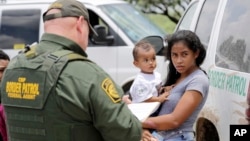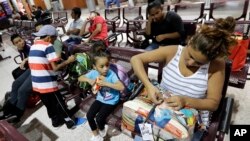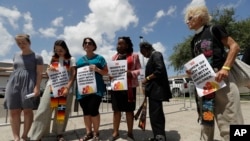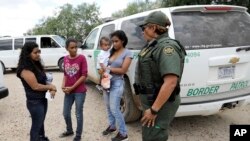This week, a judge in the United States gave the federal government 30 days to reunite detained migrants with their children.
The deadline was set Tuesday by a judge in San Diego, California. The order requires U.S. border officials to return children under age 5 to their parents within 14 days.
The judgement came in a case brought by the American Civil Liberties Union. The group went to court in March seeking to end separations of migrant families. That case involves two youngsters. They were separated from their parents while the adults sought entry into the United States.
In his ruling, U.S. District Judge Dana Sabraw said that the situation with separated migrant families had “reached a crisis level.”
President Donald Trump and his administration are trying to stop the flow of illegal immigrants. In April, the administration started enforcing a policy aimed at strengthening border security. The measure requires the government to bring criminal charges against adults who are caught while trying to cross the border illegally.
This meant that under U.S. law, the children could not stay with their parents in detention. They were instead sent to shelters operated by the Department of Health and Human Services (HHS).
More than 2,000 children were separated from their parents under the measure. Some boys and girls were housed in tents in the state of Texas, near the Mexican border. Others were sent to shelters or centers in other states.
Many activist groups, U.S. lawmakers and other Americans have criticized the family separations. They raised concerns about the children and the conditions in which they were kept in. Audio of separated children crying and images of detention centers led to more criticism.
But administration officials defended the policy, saying the children are well cared for and being treated humanely. Recent studies showed that about two-thirds of Americans opposed the separation policy.
Last week, President Trump signed an executive order to end the separations of parents from children at the border. Trump has said he supports efforts to reunite migrant families.
Administration officials have proposed holding the children and their parents together inside immigration detention centers. But a 1997 government settlement generally bars the government from keeping children in detention with their parents for more than 20 days.
The administration plans to seek legal action to block the agreement, known as the Flores settlement. Government lawyers were expected to ask a judge for permission to let the families stay together until their immigration cases are completed.
U.S. officials have said they are working to reunite all families as soon as possible. But they have yet to speak publicly about plans aimed at meeting the judge’s deadlines.
U.S. Defense Secretary Jim Mattis said this week his department is preparing to house detained migrants on at least two military bases. Officials have said the temporary shelters will be designed to house up to 20,000 people.
The children are currently being held by the Office of Refugee Resettlement, which is part of HHS. It says the government can keep them “in a temporary shelter or hosted by an appropriate family.” Children unable to be reunited with family would likely be placed in America’s foster care system.
HHS Secretary Alex Azar told Congress Tuesday his department is still holding 2,047 immigrant children who were separated from their parents. That is only six fewer children than the number given by the department last Wednesday.
Under questioning, Azar did not give a specific estimate for how long it will take to reunite families. He said his department first has to closely investigate parents to make sure they are who they say they are, and are not involved in illegal activities.
Judge Sabraw’s order also halted future family separations, unless the parent is found to be unfit or does not want to be with the child. It also ordered the government to provide telephone contact between parents and their children within 10 days.
Some adults held at an immigration center in Texas reported problems with telephone connections. The parents told immigrant advocates they had not been able to reach a phone number set up to provide information about separated children.
In the state of Virginia, Simon Sandoval-Moshenberg is a legal director with the Legal Aid Justice Center. He was reported as saying that the U.S. government “never had any plan to reunite these families that were separated.” But now, he added, officials are “scrambling to undo this terrible thing that they have done.”
I’m Bryan Lynn. And I'm Dorothy Gundy.
Bryan Lynn wrote this story for VOA Learning English, based on reports from the Associated Press and other sources. George Grow was the editor.
How do you think the government should handle the issue of separated migrant families? Write to us in the Comments section, and visit our Facebook page.
_______________________________________________________________
Words in This Story
deadline – n. a date or time when something must be finished
tent – n. structure made of metal poles and cloth that sits on the ground to be used to sleep in
executive – adj. of or related to the execution of laws
host – v. person or group that provides things needed for guests
foster – n. to look after a child as part of your family for a time, without becoming their legal parent
unfit – adj. not acceptable; lacking the necessary skills or abilities
department – n. a major part of a company, organization or government
advocate – n. someone who supports a particular idea or cause
scramble – v. move or act quickly to do, find, or get something done









